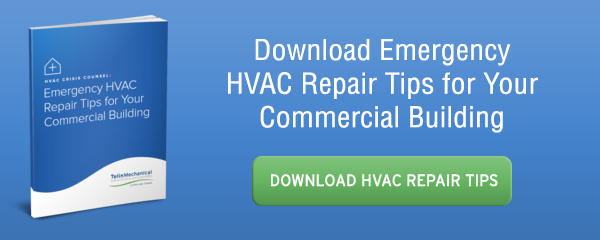Is Your Colorado Commercial Building Prepared for Nature’s Worst?

Preparation, quality construction, and common sense will go a long way to keep people and property safe from natural disasters. But, sometimes, all we can do is huddle up and wait for the storm to pass, then go assess the damage.
While our Southwest U.S. and greater Washington D.C. service area doesn’t often face earthquakes, tornadoes or hurricanes like some other parts of the country do, there’s always the possibility of an anomaly. Violent storms, flooding, and even blizzards have hit our clients in these regions at various times over the years. When these incidents occur, they can jeopardize the health, welfare, and operations of commercial facilities, resulting in one or more of the following:
- Power outages
- Heavy wear and tear on parts and circuits
- Loss of production time
- Mechanical failures and subsequent repairs
As a commercial building owner or facility manager, it’s important to ask yourself: Is my building prepared to handle the worst Mother Nature has to offer?
Preparation is key
Once disaster strikes, it’s too late to prepare the best response method. Preparation needs to happen ahead of time, and thus needs to be a priority of facility owners and managers. According to Industry Week, there are a number of practical steps you can take now to be better prepared to face a disaster later:
- Conduct a risk assessment: Ask yourself: What disasters could realistically pose a threat where my building is located? While earthquakes may be rare in your area, blizzards and ice storms could be a distinct possibility. It doesn’t make sense to waste time and money preparing for things that will never happen. Focus instead on those circumstances that are likely to develop.
- Create emergency response assignments: Members of the leadership and front line teams throughout your facility should be assigned logical roles to take on in the event of an emergency. It’s important to make sure these individuals have the knowledge, tools, and resources they need to carry out their roles effectively.
- Make an emergency response plan: Document a step-by-step plan to ensure everyone in the building will be safe and secure during an emergency, and that vital systems and records will be protected. Give thought to how quickly the plan can be carried out. Mother Nature doesn’t always provide adequate warning. For example, the average warning before a tornado strikes is only 13 minutes. If it takes longer than that to mobilize your emergency response plan, it may not be good enough. Be sure to incorporate how you’re going to communicate — both internally and externally — throughout the event.
- Arrange for clean-up and repairs ahead of time: After the danger has passed, every building in the area is going to be calling the same limited supply of skilled workers to handle repairs and get things back online. By making arrangements ahead of time, with parameters around how quickly repairs will be made, you’re likely to be back up and running faster and with fewer headaches.
Emergency HVAC Repair Services Offer Peace Of Mind
The best way to avoid costly, unexpected repairs and downtime is to prevent them through a regularly scheduled maintenance program covering your commercial HVAC system. But, maintenance isn’t going to prevent damage caused by a natural disaster, so you also need to have a contingency plan in place.
Over years of working with hundreds of different facilities in all manner of climates and circumstances, we’ve developed an emergency HVAC repair protocol that provides building owners and facility managers with that contingency plan, as well as peace of mind.
As is the case with first responders on the scene of any emergency, our HVAC technicians’ main goal is reaching a quick and efficient resolution. To do this they will:
- Assess the problem
- Keep it from spreading
- Repair the damage quickly
Getting you back up and running as quickly and painlessly as possible, and getting your employees back to work — that’s what our emergency repair plan is all about.
If you’re not completely comfortable with your commercial facility’s emergency HVAC repair plan in Colorado or Arizona contact us to learn more about how you can improve it today.

